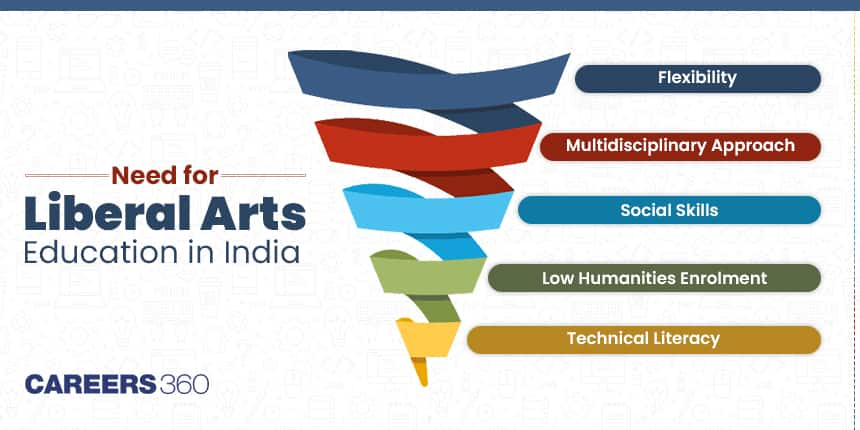But as they say, History repeats itself, and the need for a well-rounded education can be seen again in the country. While a specialised degree is valuable, it limits students' exposure to diverse fields. This focus on a single subject can lead to mental strain and halt the development of critical thinking, reasoning, and problem-solving skills.
Also Read: Future of Liberal Arts
To address this issue and equip students with essential skills like creativity, innovation, teamwork, and communication; the New Education Policy (NEP) emphasises the importance of liberal arts education. In the following section, we will look into the specific reasons why a liberal arts education is crucial in India's educational landscape.
Shoolini University Admissions 2025
NAAC A+ Grade | Ranked No.1 Private University in India (QS World University Rankings 2025)
GNA University MA Admission 2025
100% Placement Assistance | Avail Merit Scholarships
Also Read: Top Liberal Arts Specialisation in India
Need for Liberal Arts Education in India
The Indian education system lacks a well-rounded and holistic education approach. Liberal arts degrees address this issue and come with a multidisciplinary method of learning. Read on to know why India needs more education like liberal arts.
Multidisciplinary Approach: For decades, Indian education has been rigid with limited scope for interdisciplinary study, especially in higher education. A long-felt need existed for an educational approach that allowed students to explore subjects from multiple disciplines together.
Liberal arts education fulfils this need perfectly and combines the study of multiple disciplines in a single degree. Integrating STEM (Science, Technology, Engineering, and Mathematics) with arts and humanities subjects is the foundational principle of liberal arts education.
Also Read: How Liberal Arts Can Help in Today's Job Market?
Flexibility: The previous education system had very limited flexibility and the same topics were offered over a long time. There was for sure a need to change the way education was provided. NEP has focused on this issue by introducing flexible learning options, not only in subject selection but also in course duration, learning mode, and even inter-institutional transfers.
With the implementation of NEP, liberal arts education can be pursued with any course of a student’s interest. It also offers multiple exit points, such as certification if students exit in one year, a diploma on the completion of two years, and a degree after three years of study. The flexibility of moving across institutions is also a salient feature of NEP and liberal arts.
Also Read: Career Opportunities After Pursuing Liberal Arts
Social Skills: Another major need for liberal arts education was to provide students with social skills along with technical training. A report published by the Sapien Labs Centre for the Human Brain and Mind in 2023 showed that more than 50 per cent of the youth in India have poor mental health.
Because of the increase in the number of suicides committed by students over the decade and the decline in the moral well-being of students, there was a need for such education. In liberal arts, students are also taught to enhance their thinking, emotional intelligence, problem-solving, and confidence to overcome any situation in their personal and professional lives.
Low Enrolment in Humanities: With the high value of scientific and technology subjects in this digital era, colleges witnessed less enrolment in humanities and social sciences subjects. So, there was a need to change the traditional learning routes and hence many educational institutions have come with liberal arts degrees.
Colleges have started providing humanities courses along with technical subjects. For example, a liberal arts degree by combining computer science and history in a single degree.
Also Read: Liberal Education as per NEP 2020
Technical Literacy: We can not deny the fact that having technical skills is important for every student regardless of their academic background. Presently, there is absolutely no focus on providing basic technical literacy to students with humanities and social sciences students.
But, liberal arts degrees bridge the gap by combining technical education with humanities subjects. This allows students with backgrounds in humanities to pursue careers in technical fields.
Consider a liberal arts degree that integrates computer science with history or philosophy. Such a degree equips graduates with a unique combination of technical and social science knowledge which is uncommon in regular/specialised degrees.

